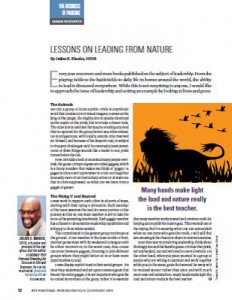Every year sees more and more books published on the subject of leadership. From the playing fields to the battlefields to daily life in homes around the world, the ability to lead is discussed everywhere. While this is not surprising to anyone, I would like to approach the issue of leadership and setting an example by looking at lions and geese.
The Animals
We call a group of lions a pride. Pride is a symbolic word that creates a lot of visual imagery. Known as the king of the jungle, the mighty lion is usually identified as the leader of the pride, but let’s take a closer look. The male lion is afforded the luxury of eating any food that is captured for the group before any other animal. He is polygamous, with loyalty usually only reserved for himself, and because of his despotic rule, is subject to frequent challenges until he eventually loses power. None of these things sounds like a leader to me; pride comes before the fall.
Now, let’s take a look at an animal many people overlook: the goose. Groups of geese are called gaggles, which is a funny moniker that makes me think of “giggle.” A giggle is often a sort a precursor to a full-out laugh but is usually more of an involuntary action or at least one that is often suppressed. So what can we learn from a gaggle of geese?
The Flying V and Beyond
Geese work to support each other in all sorts of ways, starting with their flying V formation. Each member of the team assumes the lead for some portion of the journey so that no one team member is left to take the force of the prevailing headwinds. Each gaggle member has a chance to demonstrate leadership capabilities and is happy to do so when needed.
The commitment to the greater group continues on the ground. If one member of the team is sick or hurt, another goose stays with its weakened colleague until he either recovers or, in the worst case, dies. Geese can move between gaggles, choosing to join different groups where they might better fit in or have more opportunities to lead.
Geese display explicit trust in their social groups—it’s clear they understand and act upon common goals that benefit the entire gaggle. It is not important who gets the so-called lion’s share of the glory; rather it is essential that every member works toward and receives credit for helping accomplish the team’s goal. This reminds me of the saying that it’s amazing what one can accomplish when no one cares who gets the credit; I will add that also amazing is the chance to share in common success.
Next time you’re pondering leadership, think about the kingly lion and the humble goose. It’s clear that pride, left unchecked, can and will lead to one’s downfall. On the other hand, when you place yourself in a group of people who are willing to sacrifice and work together while you do the same, goals that seemed far away will be realized sooner rather than later, and with much more ease and satisfaction. Many hands make light the load and nature really is the best teacher.
Julius E. Rhodes, SPHR, is founder and principal of the mpr group and the author of BRAND: YOU Personal Branding for Success in Life and Business. He can be reached at: jrhodes@mprgroup.info or 773.548.8037.
TPP-2014-02-Lessons on Leading from Nature

